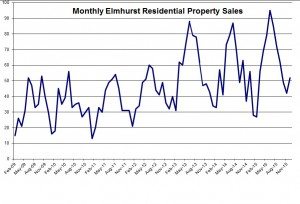Because Cook County property taxes are paid in arrears a home seller always owes back property taxes at closing which need to be paid. The home buyer certainly doesn’t want to pay them. However, the actual amount owed is unknown at that time. Therefore, the buyer and the seller have to agree upon some sort of estimation methodology and prorate the estimated taxes based upon how long the seller owned the property without paying the taxes.
Historically, home buyers and sellers would often agree to prorating the unpaid taxes based upon 105 – 110% of the last tax bill under the assumption that there would be a modest increase in the property taxes. However, things got complicated last year when the triennial assessment produced drastically different assessed values from the previous values after the assessor’s office finally got their act together. For example, the median assessed value in Lake View Township went up by 31.9%. That’s a comparison of medians so many properties saw increases in excess of that amount.
Clearly 105% or 110% just won’t cut it. Nevertheless, we’ve seen lawyers and realtors that apparently didn’t get the memo and they’re just fine with those old standby adjustments. As long as their mistakes work in our clients’ favor we certainly don’t say anything. But they really should know better.
But we’ve seen another mistake made by lawyers and realtors who do understand the implications of higher assessed values. Many are assuming that a 40% increase in assessed value will translate into a 40% increase in property taxes and are asking for a proration on that basis. However, as I’ve pointed out in a previous blog post that’s just not how the system works. As explained in the 2017 Cook County tax rate report: “Tax rates are calculated by dividing the amount of money each taxing district requested in their levy by the total taxable value within each district.” In other words, if the taxable value of the district goes up the tax rate is going to go down. They even say as much a few lines later in the report: “Typically, when taxable values increase, taxpayers will see a corresponding reduction in tax rates.”
So we get into these inane debates with opposing lawyers and realtors about how to prorate the property taxes but unfortunately one of the problems with misinformed people is that they don’t know they are misinformed. When all else fails the easiest solution is to just propose that the home seller escrow enough money to pay the highest estimate of their portion of the tax bill. Then when the actual bill comes out the seller’s portion is taken from escrow with the balance returned to the seller. Any reasonable person should be willing to agree to this proposal. Alas, not everyone is reasonable but it’s worth a try.
#PropertyTaxes
Gary Lucido is the President of Lucid Realty, the Chicago area’s full service real estate brokerage that offers home buyer rebates and discount commissions. If you want to keep up to date on the Chicago real estate market or get an insider’s view of the seamy underbelly of the real estate industry you can Subscribe to Getting Real by Email using the form below. Please be sure to verify your email address when you receive the verification notice.

